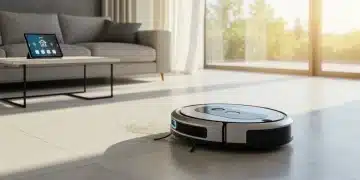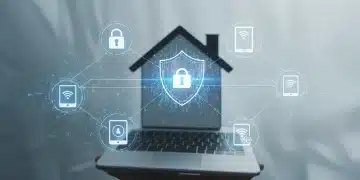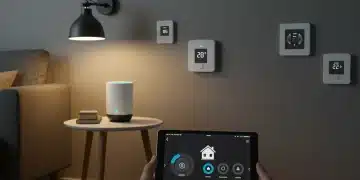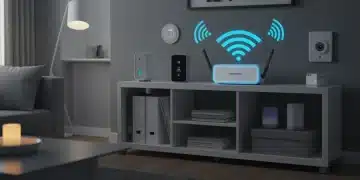Smart Home Maintenance: Tips to Keep Your Devices Running Smoothly

Smart home maintenance is key to ensuring your smart devices run smoothly and last longer, involving regular check-ups, software updates, and proper cleaning to avoid costly repairs and replacements.
Smart homes offer convenience and efficiency, but like any technology, they require regular maintenance. Neglecting your smart devices can lead to malfunctions, security vulnerabilities, and a shorter lifespan. This guide provides essential smart home maintenance tips to keep your devices running smoothly and your home safe and efficient.
Why Smart Home Maintenance Matters
Maintaining your smart home devices isn’t just about convenience; it’s about protecting your investment and ensuring optimal performance. Regular care can prevent costly repairs and replacements, enhance security, and improve energy efficiency.
By understanding the importance of maintenance, you can extend the life of your devices and enjoy a seamless smart home experience.
Preventing Costly Repairs
Regular maintenance can identify and address minor issues before they escalate into major problems. This saves you money on potentially expensive repairs or replacements.
Enhancing Security
Keeping your devices updated with the latest security patches can protect your home from cyber threats and unauthorized access.
- Firmware Updates: Always install the latest firmware updates to patch security vulnerabilities.
- Password Management: Use strong, unique passwords for all your smart devices and accounts.
- Network Security: Secure your home Wi-Fi network with a strong password and enable encryption.
Regular maintenance not only prolongs the life of your smart devices but also ensures they operate at peak performance, providing you with the seamless and efficient smart home experience you invested in.
Creating a Maintenance Schedule
A well-structured maintenance schedule helps you stay organized and ensures that no device is overlooked. Consistency is key to successful smart home maintenance.
Creating a maintenance schedule is about establishing a routine that incorporates regular check-ups, updates, and cleaning tasks for all your smart devices.

Weekly Tasks
Weekly tasks can include quick checks and minor adjustments to keep your devices running smoothly.
Monthly Tasks
Monthly tasks focus on more in-depth maintenance and cleaning to prevent buildup and ensure optimal performance.
- Clean Smart Displays: Wipe down touch screens with a microfiber cloth to remove dust and fingerprints.
- Check Battery Levels: Replace batteries in devices like smart locks and sensors to prevent unexpected failures.
- Review Automation Rules: Ensure your routines and automation rules are still working as intended.
A consistent maintenance schedule, tailored to the specific needs of your smart devices, will help you avoid unexpected issues and keep your smart home running smoothly and efficiently.
Cleaning Your Smart Devices
Dust, dirt, and grime can accumulate on smart devices, affecting their performance and aesthetics. Proper cleaning is essential to maintaining their functionality and appearance.
Cleaning smart devices is about more than aesthetics; it’s about ensuring their components function optimally, free from the interference of dust and contaminants.
Safe Cleaning Practices
Follow these guidelines to clean your smart devices safely without causing damage.
Specific Cleaning Instructions
Different devices may require specific cleaning methods. Here are some tips for common smart home devices.

- Smart Speakers: Use a soft brush or compressed air to remove dust from the speaker grills.
- Smart Displays: Wipe the screen with a microfiber cloth designed for electronics.
- Smart Lighting: Dust light bulbs and fixtures regularly to maintain brightness.
By implementing these cleaning practices, you can keep your smart devices looking and functioning their best, ensuring they remain a valuable and reliable part of your home.
Updating Software and Firmware
Software and firmware updates are crucial for fixing bugs, improving performance, and patching security vulnerabilities. Stay informed about available updates and install them promptly.
Updating software and firmware is a vital aspect of **smart home maintenance**. Timely updates ensure your devices are secure and functioning at their best.
Why Updates Are Important
Updates address security vulnerabilities, improve performance, and add new features to your smart devices.
How to Update Your Devices
Follow these steps to ensure your smart devices are always up to date.
Keeping your smart devices updated with the latest software and firmware not only enhances their performance but also adds new features and, most importantly, protects your home network from potential cyber threats.
Securing Your Smart Home Network
A secure network is the foundation of a safe and reliable smart home. Take steps to protect your network from unauthorized access and cyber threats.
Securing your smart home network is about creating a digital fortress to protect your devices and personal data from cyber threats.
Strengthening Your Wi-Fi
Your Wi-Fi network is the gateway to your smart home. Secure it with a strong password and encryption.
Managing Device Permissions
Control which devices have access to your network and limit their permissions to minimize security risks.
- Guest Networks: Use a guest network for visitors to isolate their devices from your main network.
- Firewall Settings: Adjust your firewall settings to block unauthorized access attempts.
- VPN: Use a VPN for an extra layer of security when accessing your smart home network remotely.
By focusing on strengthening your Wi-Fi and carefully managing device permissions, you can create a robust security posture for your smart home, ensuring that your devices and data remain safe and protected.
Troubleshooting Common Issues
Even with proper maintenance, you may encounter occasional issues with your smart devices. Knowing how to troubleshoot common problems can save you time and frustration.
Troubleshooting common issues is about equipping yourself with the knowledge to quickly resolve problems and minimize disruptions to your smart home experience.
Connectivity Problems
Connectivity issues are among the most common problems with smart devices. Here are some troubleshooting steps for WiFi and Bluetooth connectivity.
Device Unresponsiveness
If a device is unresponsive, try these troubleshooting steps before contacting customer support.
- Restart the Device: Power cycle the device to reset its system.
- Check Power Source: Ensure the device is properly connected to a power source.
- Factory Reset: Perform a factory reset as a last resort, but be aware that this will erase all settings.
By mastering these common troubleshooting techniques, you can quickly resolve many of the issues that may arise, keeping your smart home running smoothly and minimizing disruptions to your daily life.
| Key Point | Brief Description |
|---|---|
| 💡 Schedule | Create a weekly and monthly plan. |
| 🧼 Cleaning | Dust and clean regularly for optimal performance. |
| 🛡️ Security | Update software, manage passwords, and secure Wi-Fi. |
| 🔧 Troubleshooting | Know how to fix common connectivity and responsiveness issues. |
Frequently Asked Questions
▼
You should update your devices as soon as updates are available. Check for updates weekly to ensure your system stays secure and performs well.
▼
Use a microfiber cloth specifically designed for electronics screens. Gently wipe the screen to avoid scratches and remove fingerprints or dust.
▼
Use strong, unique passwords for each device and your Wi-Fi network. Enable two-factor authentication and regularly update your devices’ software.
▼
First, try restarting the device. If that doesn’t work, check the power source and internet connection. As a last resort, perform a factory reset.
▼
Regular maintenance prevents costly repairs, keeps devices running smoothly, improves security, and extends the lifespan of your smart home devices.
Conclusion
Maintaining your smart home doesn’t have to be a daunting task. By following these tips and establishing a routine, you can ensure your devices run smoothly, your home stays secure, and you continue to enjoy the convenience and efficiency of smart living.





